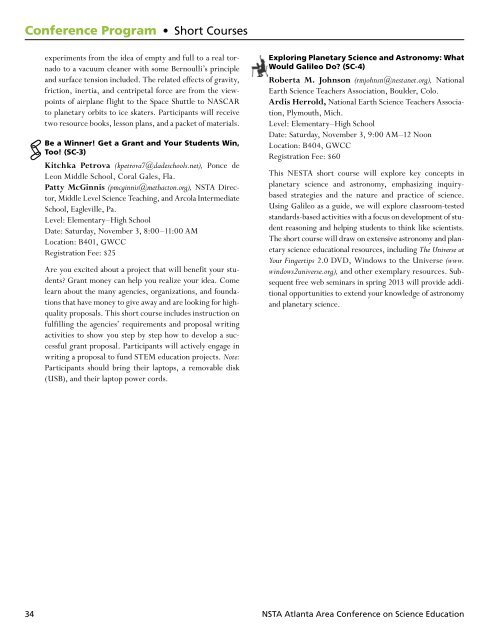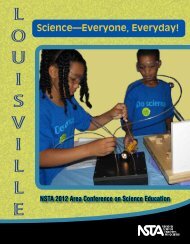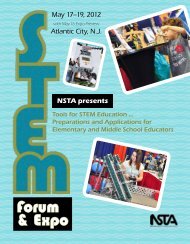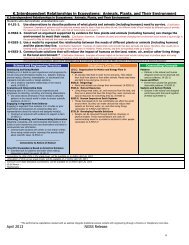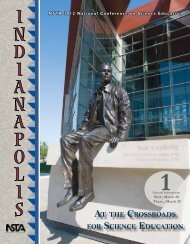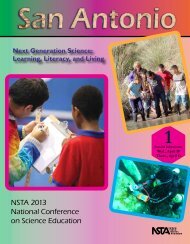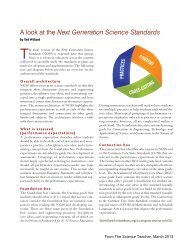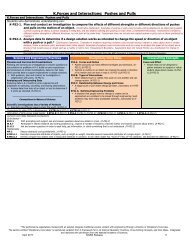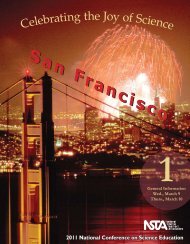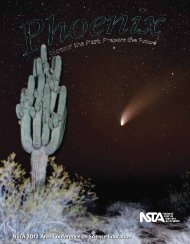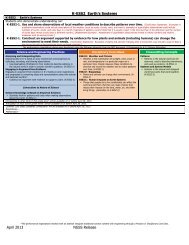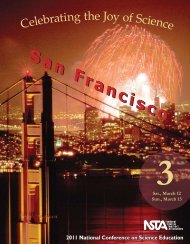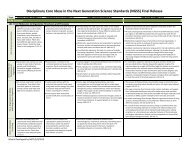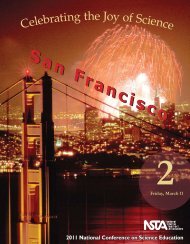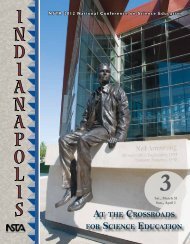Atlanta Conference Program
Atlanta Conference Program
Atlanta Conference Program
You also want an ePaper? Increase the reach of your titles
YUMPU automatically turns print PDFs into web optimized ePapers that Google loves.
<strong>Conference</strong> <strong>Program</strong> • Short Courses<br />
'<br />
experiments from the idea of empty and full to a real tornado<br />
to a vacuum cleaner with some Bernoulli’s principle<br />
and surface tension included. The related effects of gravity,<br />
friction, inertia, and centripetal force are from the viewpoints<br />
of airplane flight to the Space Shuttle to NASCAR<br />
to planetary orbits to ice skaters. Participants will receive<br />
two resource books, lesson plans, and a packet of materials.<br />
Be a Winner! Get a Grant and Your Students Win,<br />
Too! (SC-3)<br />
Kitchka Petrova (kpetrova7@dadeschools.net), Ponce de<br />
Leon Middle School, Coral Gales, Fla.<br />
Patty McGinnis (pmcginnis@methacton.org), NSTA Director,<br />
Middle Level Science Teaching, and Arcola Intermediate<br />
School, Eagleville, Pa.<br />
Level: Elementary–High School<br />
Date: Saturday, November 3, 8:00–11:00 AM<br />
Location: B401, GWCC<br />
Registration Fee: $25<br />
Are you excited about a project that will benefit your students<br />
Grant money can help you realize your idea. Come<br />
learn about the many agencies, organizations, and foundations<br />
that have money to give away and are looking for highquality<br />
proposals. This short course includes instruction on<br />
fulfilling the agencies’ requirements and proposal writing<br />
activities to show you step by step how to develop a successful<br />
grant proposal. Participants will actively engage in<br />
writing a proposal to fund STEM education projects. Note:<br />
Participants should bring their laptops, a removable disk<br />
(USB), and their laptop power cords.<br />
Exploring Planetary Science and Astronomy: What<br />
Would Galileo Do (SC-4)<br />
Roberta M. Johnson (rmjohnsn@nestanet.org), National<br />
Earth Science Teachers Association, Boulder, Colo.<br />
Ardis Herrold, National Earth Science Teachers Association,<br />
Plymouth, Mich.<br />
Level: Elementary–High School<br />
Date: Saturday, November 3, 9:00 AM–12 Noon<br />
Location: B404, GWCC<br />
Registration Fee: $60<br />
This NESTA short course will explore key concepts in<br />
planetary science and astronomy, emphasizing inquirybased<br />
strategies and the nature and practice of science.<br />
Using Galileo as a guide, we will explore classroom-tested<br />
standards-based activities with a focus on development of student<br />
reasoning and helping students to think like scientists.<br />
The short course will draw on extensive astronomy and planetary<br />
science educational resources, including The Universe at<br />
Your Fingertips 2.0 DVD, Windows to the Universe (www.<br />
windows2universe.org), and other exemplary resources. Subsequent<br />
free web seminars in spring 2013 will provide additional<br />
opportunities to extend your knowledge of astronomy<br />
and planetary science.<br />
34 NSTA <strong>Atlanta</strong> Area <strong>Conference</strong> on Science Education


